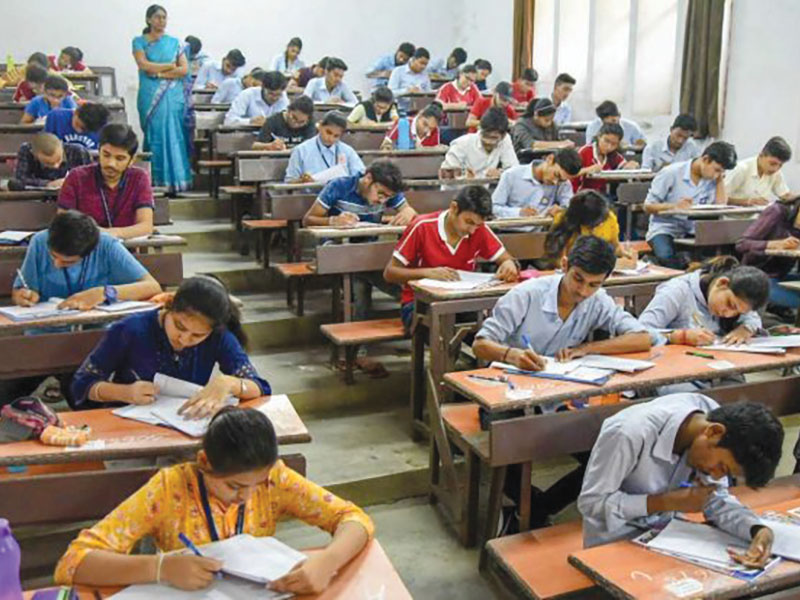Reshma Ravishanker (Bengaluru)

CET scene: complicated admissions process
Officials of the enforcement Directorate (ED) conducted raids at multiple locations across Bengaluru on June 25 and 26 while investigating an alleged ‘seat blocking’ admissions scam in the state’s 254 private engineering colleges. Among the locations raided were campuses of the city’s top-ranked BMS College of Engineering, Akash Institute of Engineering and Technology and New Horizon College of Engineering, and residences/offices of independent education consultants and “blocking agents”.
According to ED investigators, they recovered Rs.1.37 crore in cash, several incriminating documents and digital devices from the premises of these engineering colleges which they proclaimed are proceeds of malfeasance.
‘Seat blocking’ is the outcome of a complicated government-designed admission process for private engineering colleges in the heyday of Nehruvian licence-permit-quota raj. Following a Supreme Court judgement in Unnikrishnan’s Case (1993), 50 percent of seats in private professional colleges were reserved for students topping government CETs (common entrance tests) who paid way-below-cost fees, another 30 percent were reserved at a slightly higher price point determined by government, leaving a mere 20 percent to be priced by institutional managements.
However after liberalisation and deregulation of the Indian economy in 1991, in T.M.A. Pai vs. Union of India (2002), a full bench of the apex court overruled its own verdict in the Unnikrishnan Case and held that unaided (independent) private professional education institutions have a fundamental right to administer their own institutions, including prescribing their admission processes and tuition fees. But subsequently, in two successive judgements (Islamic Academy (2003) and P.A. Inamdar vs. State of Maharashtra (2005)), the apex court diluted its TMA Pai Case judgement and allowed state governments to constitute fees-fixation committees to ensure fees charged by private professional colleges are “reasonable”.
With the T.M.A. Pai judgement having permitted professional colleges to determine their own admission processes subject to admitting students on merit, in 2004 private colleges grouped under the banner of the Consortium of Medical, Engineering and Dental Colleges of Karnataka (Comed-K) began conducting a common entrance test for its 198-member institutions. However, conducting this didn’t go down well with the state government. Under a new arrangement, Comed-K member colleges agreed to allocate 47 percent of their seats to top-ranked CET students at government-negotiated fees every year even as Comed-K continued to conduct its own parallel entrance test. The remainder 30 percent seats are allocated to Comed-K exam toppers under differently priced fees, and 23 percent are permitted to be allocated by the management at substantially higher fees. Currently, the annual tuition fees for each category are: government CET students: Rs.90,000-1.5 lakh; Comed-K toppers: Rs.1.5-3 lakh; management quota: Rs.4.5-12 lakh and NRI Rs.8 lakh and above.
Last November (2024), officials of the Karnataka Examinations Authority (KEA), which conducts CET, uncovered a seat blocking scam allegedly devised by the said private engineering colleges. These ‘blocked’ seats are usually of students who top CET, but don’t claim their private college seats on admission day, resulting in these seats reverting to the management to be ‘sold’ for higher tuition fees. With the difference between fees paid by — government CET and management quota students massive (Rs.3-11 lakh per year), private colleges benefit by admitting students under the latter quota. “2,625 government engineering seats were blocked and subsequently transferred to colleges as management quota seats. This allowed institutions to earn large profits, while reducing opportunities for deserving meritorious students,” says a KEA official.
According to Dr. S. Kumar, executive secretary, Comed-K, the root cause of this and other rackets in private college admissions is that private colleges are obliged to allot 47 percent of capacity to government-selected CET students at way-below-cost prices. “Private colleges have to cross-subsidise 47 percent of students, who don’t pay even 20 percent of the actual cost of education provision,” says Kumar.
Though Dr. Kumar declined to comment on the tenuous seat-sharing agreement with the state government, it’s evident that despite successive court judgements giving private professional colleges the right to determine their own admission processes and fees structures, state governments refuse to respect them and bully private college managements to accept cross-subsidy schemes. The root of this enduring problem is government interference with the administration and management of privately promoted education institutions despite the apex court’s judgement in the TMA Pai Case.
Also Read: Karnataka private schools urge students to attend PT classes amid rising health concerns